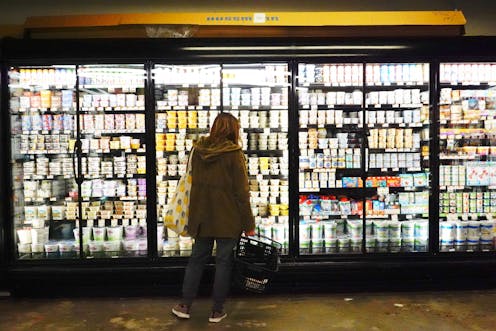Latest inflation figures are good news – even if they give a lot of people heartburn
- Written by Christopher Decker, Professor of Economics, University of Nebraska Omaha

The U.S. economy is slowing, but not crashing. In the dismal science[1], this is what counts as good news.
That’s the message I took away from the latest inflation data[2], released May 15, 2024, which showed U.S. consumer prices rising 3.4% [3] in the 12 months to April 2024. This is down slightly from the 3.5% year-over-year increase reported in March 2024.
In other words, while prices are rising, they’re not going up as sharply as they once were. That’s good news for shoppers; the U.S. economy is far from the 9.1% annual inflation[4] seen in June 2022.
While energy and shelter prices increased in April, these gains were relatively modest. Meanwhile, food prices remained steady compared to last year and even declined by 0.2% compared to March. What’s more, people in the market for a car were in luck: New and used vehicle prices fell 0.4% and 6.9%, respectively, in April.
The “core” consumer price index — which doesn’t include volatile food and energy prices[5] and is often considered better at predicting future inflation than so-called “headline” CPI figures — is also down slightly. After posting a year-over-year increase of 3.9% in January and 3.8% in February and March, it slowed to 3.6% in April.
So the overall report is relatively positive: It didn’t show the uptick in inflation that many consumers feared, and reported inflation rates were actually slightly lower than market expectations.
As an economist[6], I see this data report as yet more evidence that economic growth is slowing — in a good way. The economy grew at a lower-than-expected 1.6% rate[7] in the first quarter of 2024, according to the most recent gross domestic product data from the Bureau of Economic Analysis. The most recent jobs report[8] also showed a slowdown in hiring[9], and the latest data on job vacancies similarly showed the labor market cooling off[10].
Why the Fed is paying close attention
The Federal Reserve’s main objective is to strike a balance between two goals[11]: maintaining stable employment and ensuring price stability. It does this by managing and influencing interest rates.
Lowering rates stimulates the economy, which encourages economic growth and job creation – but that can fuel inflation. Raising rates does the opposite: Economic growth slows, which dampens inflation, but also hinders employment.
So, when inflation started increasing dramatically after the COVID-19 pandemic, the Federal Reserve responded with a two-year campaign of rate hikes – they’re currently at a 23-year high[12]. Since this raises the cost of borrowing, investors and potential homebuyers are keen for the Fed to dial back its rates.
After May’s report, I don’t believe the Federal Reserve will be in any rush to cut interest rates from their current elevated level. There’s a slowdown, to be sure, but the slowdown is so steady that it’s not pulling prices down in any rapid fashion.
This is no doubt frustrating for the Fed — which has an inflation target of 2%[13] — as well as for potential homebuyers. But it’s evidence that the economy is stable at the moment. Inflation isn’t surging, and consumer spending, according to the Bureau of Economic Analysis, is still growing. In March, consumer spending increased 5.8% year over year[14], up from February’s 4.9% rate.
All eyes on the American shopper
Going forward, hopes for a “soft landing[15]” — economist-speak for when the Fed slows inflation without triggering a recession — will depend in large measure on U.S. shoppers. Consumer spending makes up roughly two-thirds[16] of U.S. gross domestic product.
If American shoppers suddenly stop spending, then inflation will slow considerably, job vacancies will evaporate, and gross domestic product could contract. At that point, the Fed will turn attention away from inflation and toward economic stimulus, and rates will fall.
I mention this because a recent report by the Federal Reserve Bank of St. Louis showed a troubling uptick in consumer credit card delinquency rates[17]. If much of the recent increase in consumer spending is due to Americans relying more on credit cards, then the economy could be on shakier ground than it appears.
The good news is that delinquency rates are still way below where they were ahead of the Great Recession, which lasted from December 2007 through June 2009[18]. So, while this data may be troubling, there’s no need to panic just yet.
In short, while inflation rates still aren’t to the Fed’s liking, the economy – for now – appears to be on a stable path.
References
- ^ the dismal science (www.investopedia.com)
- ^ latest inflation data (www.bls.gov)
- ^ U.S. consumer prices rising 3.4% (www.reuters.com)
- ^ 9.1% annual inflation (www.cnbc.com)
- ^ which doesn’t include volatile food and energy prices (www.clevelandfed.org)
- ^ As an economist (scholar.google.com)
- ^ lower-than-expected 1.6% rate (www.bea.gov)
- ^ most recent jobs report (www.bls.gov)
- ^ slowdown in hiring (www.cnbc.com)
- ^ similarly showed the labor market cooling off (www.bls.gov)
- ^ strike a balance between two goals (www.federalreserve.gov)
- ^ 23-year high (theconversation.com)
- ^ inflation target of 2% (www.federalreserve.gov)
- ^ consumer spending increased 5.8% year over year (www.bea.gov)
- ^ soft landing (www.imf.org)
- ^ roughly two-thirds (fred.stlouisfed.org)
- ^ troubling uptick in consumer credit card delinquency rates (www.stlouisfed.org)
- ^ Great Recession, which lasted from December 2007 through June 2009 (www.federalreservehistory.org)







